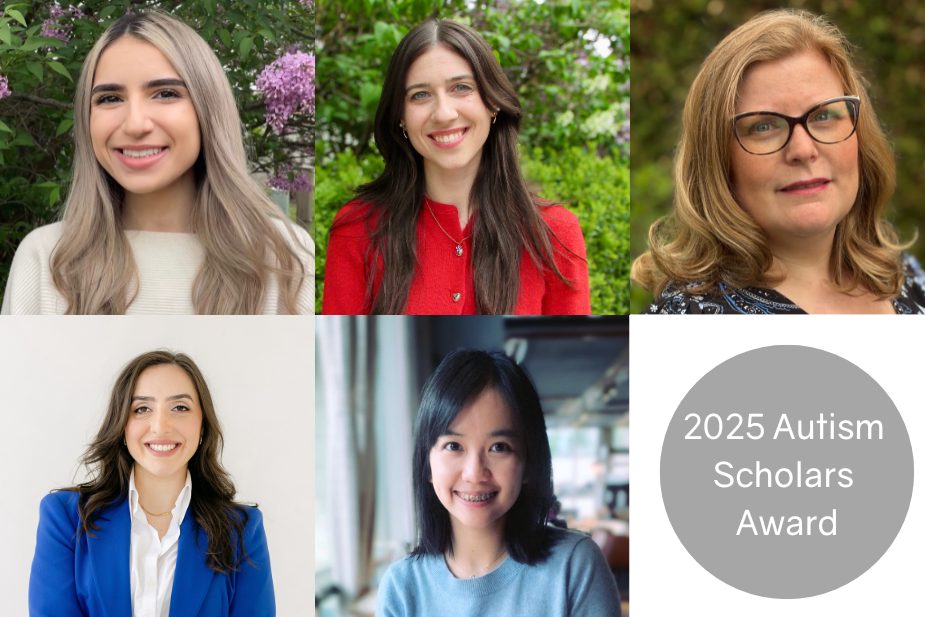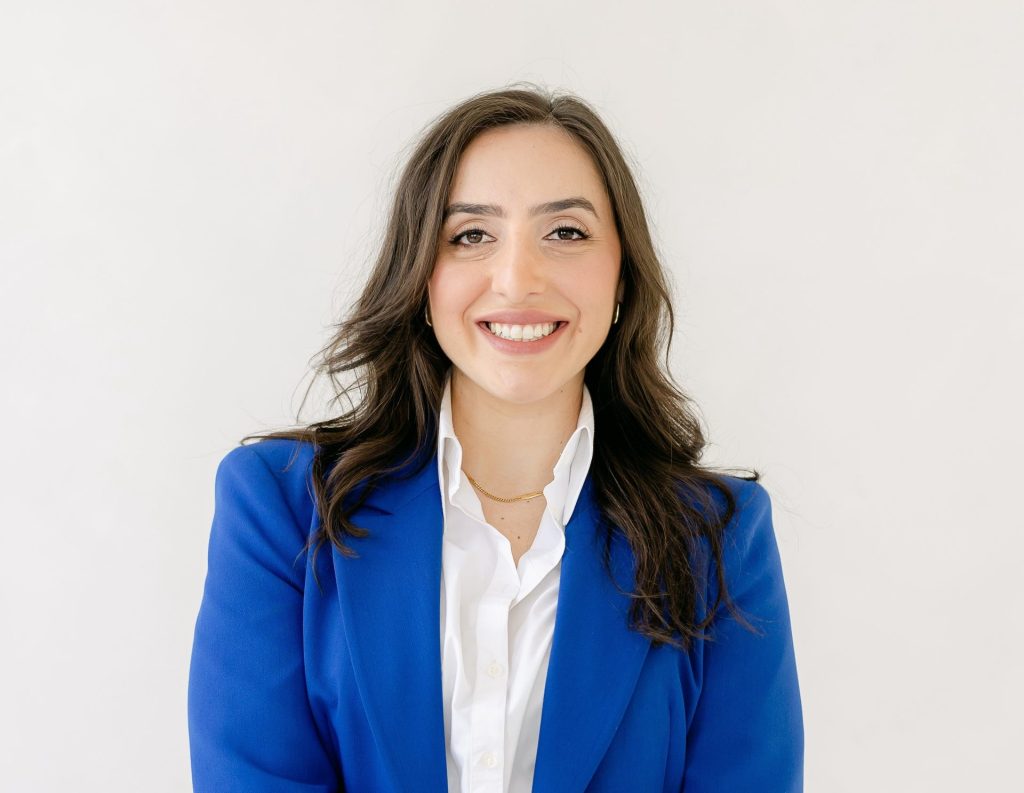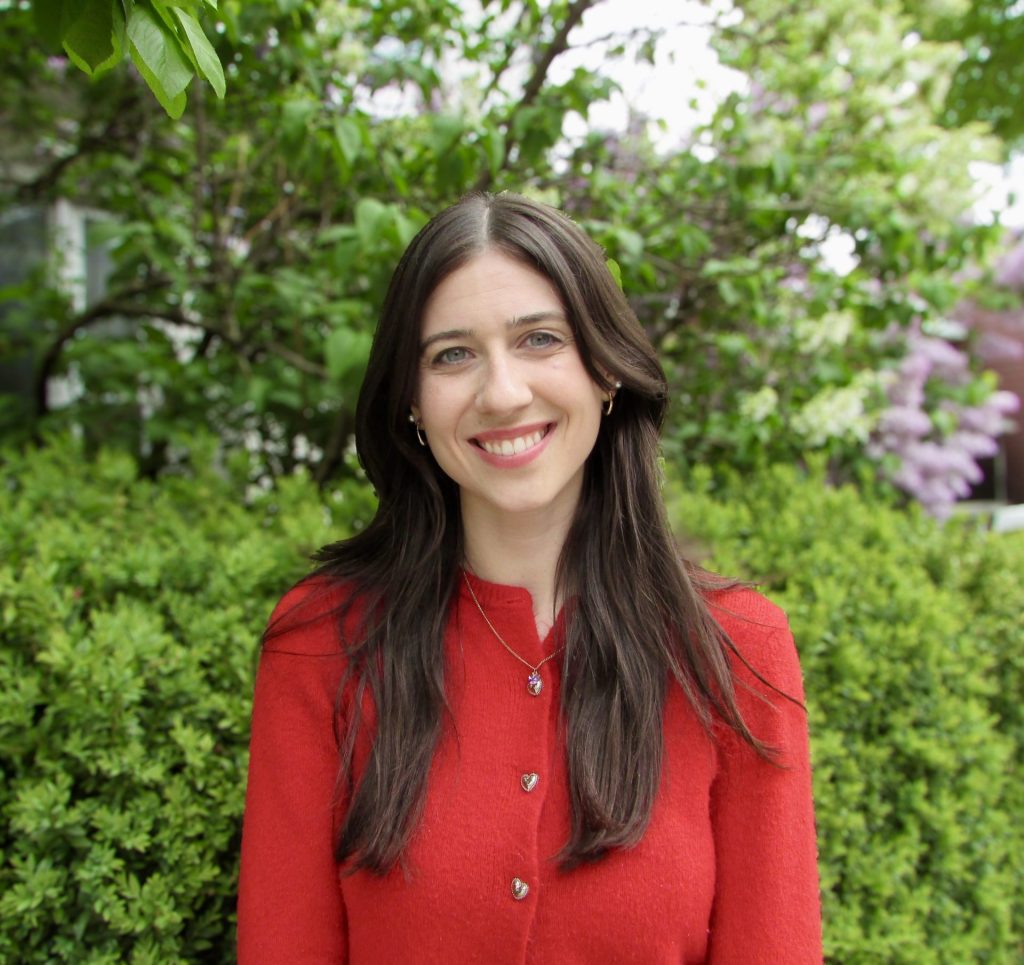Autism Scholars Award 2025
Autism Scholars Award 2025

The Council of Ontario Universities is pleased to recognize five Ontario university graduate students for their pioneering autism research that supports discoveries, treatments and contributions and will positively impact individuals with autism and their families. Each year, the Autism Scholars Award is presented to doctoral and master’s-level researchers at an Ontario university.
This year’s recipients of the doctoral-level Autism Scholars Award and a $20,000 prize are Madeline Marie Asaro from Brock University, Sarah Al-Saoud from Western University, Yue Lyu from University of Waterloo.
Asaro’s research is centered around how caregiver-led, gentle behaviour-analytic strategies can help address food selectivity in autistic children.
Al-Saoud’s research explores the biological basis of restricted and repetitive behaviours in autism spectrum disorder.
Lyu’s research aims to support the emotional development of autistic children by creating practical Generative AI and Augmented Reality tools.
Additionally, this year’s recipients of the master’s-level Autism Scholars Awards and a $18,000 prize are Jennifer Crookshank from Carleton University and Jessica Klein from York University.
Crookshank’s study examines how emotion-based school avoidance develops in early childhood to inform earlier interventions and improve outcomes.
And, Klein’s research aims to improve mental health support for youth with co-occurring autism and intellectual disability by understanding both the challenges and the factors that promote wellbeing.
The Autism Scholars Awards Program was established with the support from the Ministry of Colleges and Universities to ensure Ontario continues to promote leading-edge scholarship into autism, which affects one in 50 Canadian children, according to the Public Health Agency of Canada.

Doctoral Award
Madeline Marie Asaro, Brock University

Refusing foods (food selectivity) can have negative impacts on children and their families, and Madeline Marie Asaro’s study explores how caregiver-led, compassionate behaviour-analytic strategies can help address food selectivity in autistic children.
Food selectivity is more common in autistic children, making effective and accessible interventions essential. While behaviour analysts can help, clinician-led approaches can often lead to long wait times for families. Asaro’s study tests how effective it is to teach caregivers, in person and through telehealth, to use a compassionate behaviour-analytic feeding intervention with their autistic children. The approach uses choice, shaping, and reinforcement. For example, letting the child pick a food and an action (like smelling or swallowing it), then matching rewards to their response, with the best rewards saved for swallowing the food. The goal is to give caregivers practical tools to expand the number and variety of food their child eats and support lasting progress.
With high demand for feeding support across Canada, Asaro’s work offers the opportunity to influence clinical practice and improve the quality of life for children and families. It will also help caregivers, including those with limited access to behaviour analysts, acquire the skills to manage food selectivity. Asaro is a doctoral student in the Applied Behaviour Analysis (ABA) program at Brock University. She is a Registered Behaviour Analyst (Ontario) and a Board-Certified Behavior Analyst. She received her Bachelor of Arts with Honours from the University of Toronto and her Master of Arts, specializing in ABA, from Brock University where her research focused on the diverse applications of behaviour analysis to increase physical activity in elementary school students. Along with her various research interests, Asaro is a passionate and enthusiastic clinician who has worked in different clinical settings to support and empower neurodiverse children, youth, and adults and their families to achieve their individual goals.
Sarah Al-Saoud, Western University


Restricted and repetitive behaviours can significantly affect classroom learning, attention, and social interactions. To address this, Sarah Al-Saoud’s research seeks to uncover the biological foundations of this core aspect of autism spectrum disorder.
By employing a novel, non-invasive brain imaging technique called neuromelanin-sensitive MRI, her work investigates how crucial neurotransmitters such as dopamine and norepinephrine influence behaviours including compulsive, ritualistic, restricted, and self-injurious actions.
Through identifying early brain markers, this research could guide school-based supports like individualized learning plans or executive function training, as well as inform new treatments, helping children with neurodevelopmental disorders succeed both in the classroom and beyond.
Sarah Al-Saoud completed her Master of Arts in Education in School and Applied Child Psychology at Western University and is currently pursuing the corresponding doctoral degree. She earned her Bachelor of Arts in Psychology (Honours Specialization) at King’s University College, Western University. During her undergraduate and graduate studies, she worked with the Developing Brain Lab. She is also a recipient of the Canada Graduate Scholarship from the Social Sciences and Humanities Research Council and the Ontario Graduate Scholarship.
Yue Lyu, University of Waterloo

As many autistic children face challenges with understanding emotions and social interaction skills, Yue Lyu’s research aims to support their emotional development by creating tools that are practical, adaptive, and family-friendly.
While social-emotional interventions can be effective, traditional methods are often costly, complex, and difficult for parents to use at home. Lyu addresses this gap by creating a personalized system that leverages Generative AI and Augmented Reality to make support more accessible, engaging, and effective. The AI tailors stories and activities to each child’s unique needs and progress, while AR transforms them into interactive games that keep children motivated and involved – all in a format parents can deliver without expert support.
The impact extends beyond families. In Ontario, autism-related education and intervention costs exceed $1.4 billion. By enabling effective home-based support, Lyu’s work could reduce costs, improve long-term outcomes, and advance inclusive educational technology with new directions for future design. Yue Lyu is a doctoral researcher in Human-Computer Interaction (HCI) at University of Waterloo, where she explores how emerging technologies like Generative AI and Augmented Reality can support children with Autism Spectrum Disorder (ASD) through more personalized and engaging interventions. Her research lies at the intersection of AI, interaction design, and inter for autistic children.
Master’s Award
Jennifer Crookshank, Carleton University

Jennifer Crookshank’s study examines how emotion-based school avoidance develops in early childhood to inform earlier interventions and improve school outcomes for autistic children.
Autistic children are more likely to avoid school than their neurotypical peers. While most research has focused on older children, few studies have examined how school avoidance develops in preschool-aged autistic children. Through the Pediatric Autism Research Cohort (PARC), Crookshank’s study explores how child traits, family circumstances, and school environments contribute to emotion-based school avoidance. This work aims to guide earlier interventions and improve outcomes for autistic students.
Crookshank is currently an M.A. student in the Department of Psychology at Carleton University, where she is a member of the Carleton Autism Research Lab. Her research is inspired by her experiences in the autism community and focuses on identifying child, family, and school-associated factors related to the emergence of school avoidance in young autistic children. She holds a B.Sc. in Molecular Biology and Genetics from the University of Guelph, a B.Sc. in Psychology from Carleton University, and an M.Sc. in Laboratory Medicine and Pathobiology from the University of Toronto.
Jessica Klein, York University

Youth with co-occurring autism and intellectual disability often face unique mental health challenges, and Jessica Klein’s research in this area aims to improve support by identifying both the barriers they encounter and the factors that promote wellbeing.
Using a mixed-methods design, her project compares positive and negative mental health outcomes between autistic and non-autistic youth with intellectual disability and examines how factors such as community involvement, quality of relationships, and adaptive living skills affect their wellbeing. Data for this project was collected through self-report and parent questionnaires, followed by interviews with youth to capture their experiences and the circumstances that support or negatively impact their mental health.
By expanding scientific understanding of the interpersonal and environmental factors that contribute to wellbeing in youth with co-occurring autism and intellectual disability, these findings will help to inform future mental health supports that not only address mental health concerns but also facilitate positive outcomes for these youth.
Klein is entering the second year of her master’s degree in clinical developmental psychology at York University and is a member of the Developmental Disabilities and Mental Health Lab. She holds a bachelor’s degree in psychology with a minor in applied ethics. She has worked as an education assistant within the Saanich School Board, as well as a behaviour interventionist for autistic children. Her research interests surround promoting improved wellbeing outcomes for youth with neurodevelopmental disorders.
Additional Resources:
For more information on how the awards are administered, click the link below.
